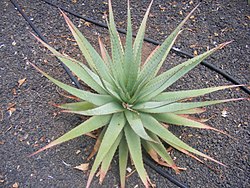| Pretoria aloe | |
|---|---|
 | |
| Flowering in winter in rocky grassland in southern Limpopo, South Africa | |
| Scientific classification | |
| Kingdom: | Plantae |
| Clade: | Tracheophytes |
| Clade: | Angiosperms |
| Clade: | Monocots |
| Order: | Asparagales |
| Family: | Asphodelaceae |
| Subfamily: | Asphodeloideae |
| Genus: | Aloe |
| Species: | A. pretoriensis |
| Binomial name | |
| Aloe pretoriensis Pole-Evans | |
Aloe pretoriensis, is a species of Aloe found discontinuously in northern South Africa, eastern Zimbabwe and eastern Eswatini. [1] [2] It occurs in rocky grassland at generally higher altitudes. It is not threatened, but human-induced declines have occurred in the Bankenveld region of Gauteng. [1] It flowers in winter and is pollinated by insects and birds. The pointy flowers are carried on elongated racemes on a decidedly tall and branched peduncle. [3] They have a tight rosette of erect, pale green leaves, which are quite thin compared to other Aloe species. [4] Drying leaf tips turn reddish.
